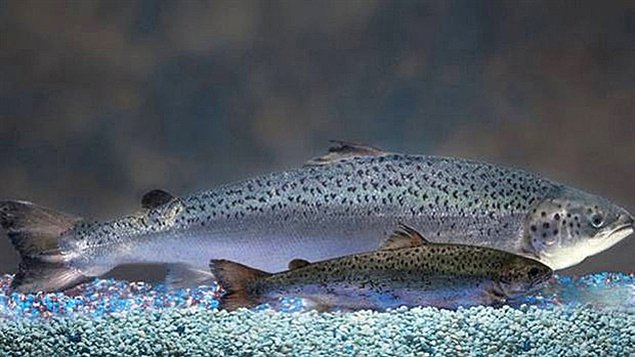The federal agency, Environment Canada, has quietly given approval for the commercial production of genetically modified salmon eggs.
The US company AquaBounty set up a research facility on the east coast province of Prince Edward Island years ago to carry out development of genetically modified salmon.
The biotech firm takes growth genes from a Chinook salmon and the “anti-freeze” gene from the ocean pout, an eel-like fish, and splices them onto an Atlantic salmon which AquaBounty claims enables the altered GM fish to grow twice as fast as a regular fish.

The Canadian approval, buried in routine business on November 23 in the Canada Gazette (the record of government business), allows the American biotech company to produce GM salmon eggs on a commercial scale.
If the Massachusetts-based firm gets approval from the US Food and Drug Administration (FDA) it would export the PEI developed eggs to its Panama facility where they would be raised into adults as sold as food.
AquaBounty Technologies hails the Canadian approval as a big step forward in a 20 year process towards its fish becoming the first approved GM food animal.
The FDA is expected to make its decision in the near future on the sale of GM salmon. Campaigners say that would lead to other approvals of some 30 other species of GM fish currently under development,
Earlier this year a member of Alaska’s state government met with P.E.I. officials to express concern over the GM fish. Representative Geran Tarr, launched a resolution asking the US Food and Drug Administration to require more testing there, or at least have the fish labelled as GMO.
“Canada needs to take responsibility for creating an international environmental risk”
Lucy Sharrat of the Canadian Biotechnoloy Action Network (CBAN), said the federal government should take note of the Panama complaint and consider the potential affects of an environmental escape.
“All the GM fish eggs come from P.E.I. and Canada needs to take responsibility for creating an international environmental risk,” she says..
Sharon Labchuk, is with the P.E.I. group “Islanders Say No to Frankenfish”, She says “We always assume that because something is as controversial as this is, the proper controls are in place. It’s also very experimental and the risks of anything going wrong are disastrous. They can wipe out the wild salmon population if these fish ever escape and their eggs end up in the wild rivers.”
Last week in a surprising move, the Environmental Advocacy Centre of Panama submitted a complaint to that country’s environmental authority alleging that AquaBounty’s creation of GM salmon breaches environmental regulations
Panama’s National Environmental Authority there inspected Aquabounty’s operation in 2012 and allegedly found violations that remained uncorrected. This included failure to submit timely reports and failure to obtain permits for wastewater discharge.
The network has sent a letter to environment minister Leona Aglukkaq asking for an explanation of how Environment Canada will assess the risks of the GM fish.







For reasons beyond our control, and for an undetermined period of time, our comment section is now closed. However, our social networks remain open to your contributions.